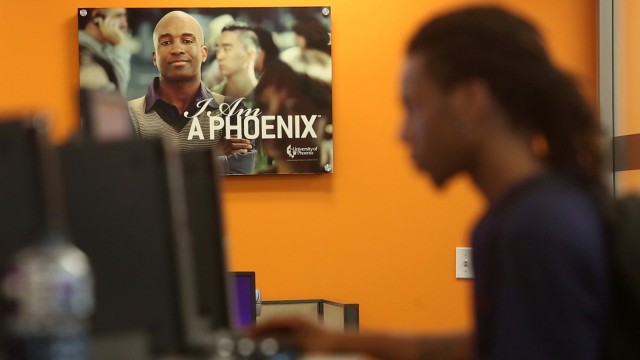Industry officials had vigorously opposed the measure. In an interview, Robert Johnson, executive director of the California Association of Private Postsecondary Schools, characterized it as part of the Legislature’s effort to kill the for-profit college sector through a “death by a thousand cuts.”
Johnson said a handful of “boutique schools” would be affected by the bill, which requires all for-profit schools that get GI Bill money to be approved by the state Bureau for Private Postsecondary Education, an agency with the power to investigate complaints and refer substantiated allegations of fraud to California’s attorney general.
Major for-profit chains would not be affected by that provision, Johnson said, because they already have been approved by the bureau or are covered by a carve-out in the bill for schools accredited by approved institutions.
The bill that emerged from the legislative process is far weaker than the sweeping reform measure Frazier introduced in February, which would have significantly curtailed large for-profit college chains’ access to GI Bill funds.
It originally would have barred colleges from receiving GI Bill money if they failed standards the state has set for its own financial aid program, Cal Grants.
The Center for Investigative Reporting revealed in June that nearly 300 California schools had received GI Bill money even though they failed those standards. The total cost to taxpayers was $638 million over five years.
Schools failed the standard because they lacked accreditation or had low graduation rates or high rates of student loan default. The University of Phoenix, the largest recipient of GI Bill money in both California and the nation, was among the schools that fell short.
Facing opposition from the for-profit education industry, Frazier removed that provision before the bill’s first hearing in April. In May, he removed another section that would have required schools to tell regulators whether veterans graduate or find jobs.
That provision was removed after the University of Phoenix’s lobbyist, Scott Govenar, sent a letter to Mike Gatto, D-Burbank, chairman of the Assembly Appropriations Committee, arguing that it would be cumbersome and “of little practical value.”
The for-profit education lobby was not the only one that expressed concern about Frazier’s bill. California’s state colleges and universities complained to lawmakers about the expense of reporting graduation rates of student veterans.
In early August, state Sen. Kevin de León, D-Los Angeles, held the bill in the Senate Appropriations Committee until Frazier removed a provision that would have required schools receiving GI Bill money to comply with voluntary guidelines established by President Barack Obama called the Principles of Excellence.
Those guidelines include providing a personalized form for each veteran detailing the cost of his or her education program, ending fraudulent or aggressive recruiting tactics, and providing a single point of contact for veterans seeking academic and financial help.
Many for-profit schools do not comply with the principles, but 15 California State University campuses and 27 community colleges also failed to follow the principles, according to a Senate committee analysis. Lawmakers did not want to appropriate the $50,000 per school that legislative analysts estimated would be needed to bring the public schools into compliance.
The bill sustained its final blow last week as it awaited a vote by the full Senate.Frazier removed its ban on GI Bill money going to any unaccredited schools in California.
That measure would have frozen out 121 schools, according to a CIR analysis of U.S. Department of Veterans Affairs data. CIR found those schools had received $23 million from the GI Bill since 2009.
Instead, the final bill cut off only “degree-granting institutions” without accreditation. Among the schools saved by that change are unaccredited massage schools, yoga programs and Bible colleges.
It’s unclear why it happened. A spokesman for Frazier said the legislation never was supposed to increase regulation on those kinds of for-profit schools.
Reached by phone, a representative of the Cinema Makeup School in Los Angeles said he believed his school would continue to be eligible for the taxpayer subsidies because it offers “diplomas” rather than degrees.
The two dozen schools that stand to be barred because they grant unaccredited degrees would receive GI Bill money until 2017 if they show they are trying to become accredited.
Ryan Doan, executive director of the for-profit International American University in Los Angeles, which offers unaccredited business degrees, said his school has launched a preemptive strike: seeking accreditation through the federally recognized Distance Education and Training Council.
“It’s a big, costly process and a time-consuming one,” Doan said, “but we can see which way things are going.”
This story was edited by Amy Pyle and copy edited by Sheela Kamath and Nikki Frick.
This story was produced by The Center for Investigative Reporting, an independent, nonprofit newsroom based in the San Francisco Bay Area. For more, visit cironline.org. Glantz can be reached at aglantz@cironline.org. Follow him on Twitter: @Aaron_Glantz.

